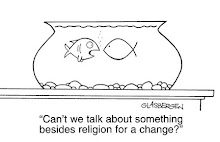Deuteronomy 5:11
"You shall not misuse the name of the LORD your God,
for the LORD will not hold anyone guiltless who misuses his name."
When I first sat down to consider what I might need to say about the third commandment, my initial thought that anything I might have to say about it would be insufferably obvious. Most conservative believers that I know read this commandment and think only one thing: That to "take the Lord's name in vain," simply means to use the term "G** D***".
Upon further review, that's not the simple case... its just another bad and typical example of "hermeneutical reductionism." Not and never a good thing...
While the thrust of this commandment gets at how many use the Lord's name to leverage power and influence through oath making, clearly the wider application for all of us is "incarnational." That is to say, that it's not only how we might use his name to convince other's in our determination to fulfill our purpose and intention- or whatever "verbal contract;" we have established. (And by the way, anytime spoken language is used, a verbal contract of some nature is established - even if only ONE person is involved.) It also has to do with how His name is associated with us in terms of what we say and do. To be a "Christian" and to wantonly sin openly, and often, is to abuse the Lord's name before the eyes of the world. If we say "yes" to Christ (and to be Christian) and "no" to the world. Then let our "yes" be truly "yes" and our "no" be truly no. Otherwise, we misconstrue to those who are watching the true nature of God.
J.I. Packer, in his recently published book: The Ten Commandments: provides for us three categories by which we can thing about the Third Commandment
- Irreverence: Cursing God When Bad Things Happen To Us, Such As Job and His Wife's Admonition to "Curse God and Die.
- Bad Language: Using God and His Name to "Damn" Other's i.e. channeling or invoking a deity to achieve a selfish end.
- Promise-Keeping: Using God to Assure Other's, That We Intend to Keep Our Oath's, Vows, and Promises.
"The godly man will make promises cautiously,
but keep them conscientiously once they are made,
knowing irresponsibility and unreliability here
are great and grievous sins."
Author Unknown








